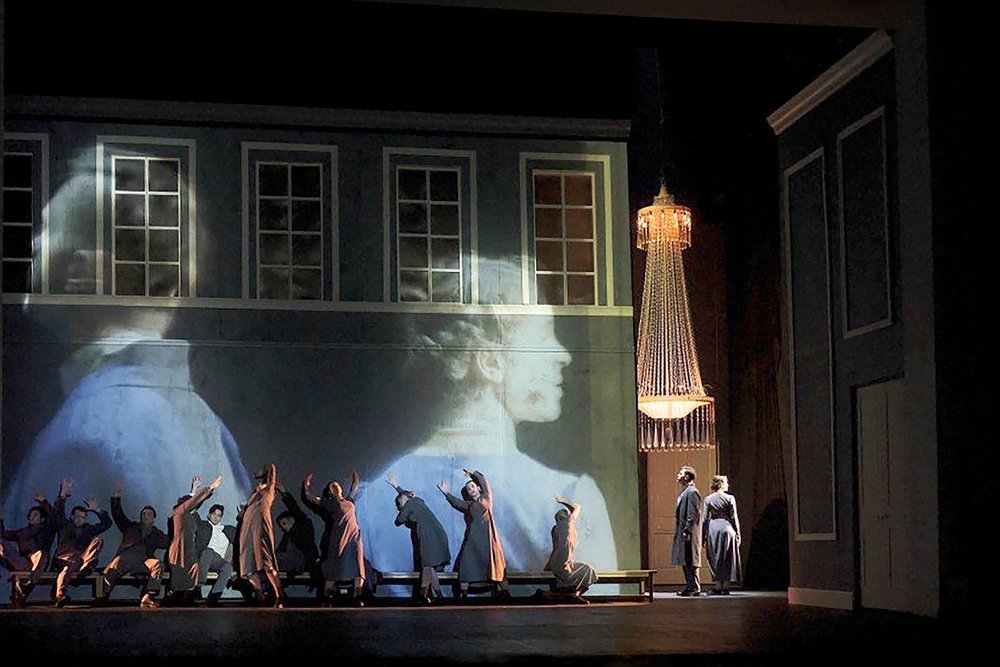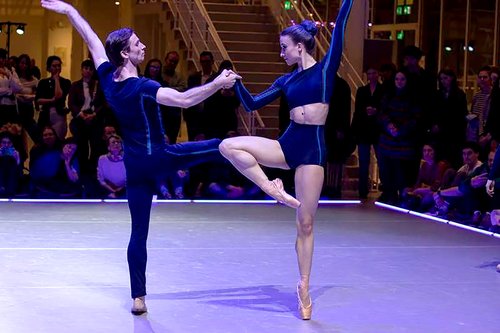Nikita Beliakov’s Artistic Synthesis Through Theatre and Movement

Eugene Onegin. Based on the novel by Alexander Pushkin. Directed by Murat Abulkatinov. Krasnoyarsk, 2023. Courtesy of Krasnoyarsk TyuZ
Nikita Beliakov embodies the spirit of artistic exploration, seamlessly blending theatre, movement, and theatre education. From choreographing avant-garde performances to teaching stage plasticity, his personal and professional journey reveals a commitment to creative synthesis and continuous growth in the ever-evolving world of contemporary theatre and dance.
I meet with Nikita Beliakov in the New Space of the Theatre of Nations, a small mansion in the heart of Moscow. Built in the city's traditional Empire style, in recent years it has become a platform for avant-garde theatre experiments. When they are not performing on stage, in the theatre’s tiny coffee shop you can encounter some of Moscow's most forward-looking and radical creatives.
Our meeting takes place there after a performance of ‘Moo-Moo’ which is being shown on the main stage of the Theatre of Nations, one of the few works by director Dmitry Krymov (b. 1954) that are still being shown in Russia today. After Krymov chose not to return from a work trip to the U.S. when the armed conflict with Ukraine broke out in 2022, most of his productions in state-funded Russian theatres were quietly removed from their programs. Theatre of Nations does not mention the name of the director on the posters advertising Moo-Moo or on its website. The play is already six years old, but it is still nearly impossible to get tickets for it - as it was in the days of its premiere. Recently one of the main roles in the play was given to actor Evgeny Tsyganov (b. 1979), and his appearance in this performance, built on impeccable accuracy of the biorhythms of each actor, meant a revision of the entire plastic language of ‘Moo-moo’, a task that went to Nikita Beliakov (b. 1994). He managed to integrate himself into Krymov's complex, literally hand-knitted world so organically that it is difficult to find seams connecting the old and the new.
For Beliakov this is by no means his first experience of a collaboration with the Theatre of Nations: he has choreographed or assisted in productions of ‘Ten Visits to My Beloved’, based on the novel by Vasily Aksyonov, directed by Murat Abulkatinov (b. 1992), and ‘A Tale of the Last Angel’ by Andrei Moguchy (b. 1961). Although Beliakov takes on a lot of acting roles in the theatre, he has far broader interests. He combined postgraduate studies at the Vaganova Academy of Russian Ballet with acting in films, teaching at Oleg Tabakov Moscow Theatre School and there have been numerous internships with maestros of contemporary dance. Is he a patriarch or someone who cannot get a handle on his hobbies? It turns out, Beliakov himself is already becoming tired of the role of jack-of-all-trades.
“I have been dancing since I was a kid. And I always wanted to follow this path. My mother supported me and took me to after-school dance classes. When I was young, I did not like classical dance, I graduated from the Choreography School of Arts in Penza. I sang, did gymnastics and wrestling. In the ninth grade I decided that I really wanted to work in the drama theatre, but to be connected in some way with choreography.”
Beliakov went on to study to become an actor in Saratov, a city close to Penza with a major theatre, where drama is included in the programme at the city’s conservatoire. As a student he found himself in demand by local theatres, and after receiving his diploma he had an invitation to join the Chekhov Moscow Art Theatre. To be recognised by Oleg Tabakov (1935-2018) was considered a great stroke of luck for an actor! It was what many dream of all their lives, fulfilled at the outset of his professional career. “But that's when everything took a different path and all my plans became mixed up,” recalls Beliakov.
At this time, he also joined a school which was created by the contemporary art festival ‘Territoria’ an initiative for students from the regions to enable them to study in Moscow, and Beliakov later joined the administrative team. It was not a case of forgetting his life’s purpose because in the end as he himself admits, his path has been shaped by a series of happy if random turning points – maybe it is down to a natural ability to be flexible in building his career. After receiving an invitation from the Theatre of Nations two years into his big move to Moscow, Beliakov concurrently enrolled in the master's programme at the Shchukin Theatre Institute with Andrei Droznin (b. 1938), a legendary teacher in the field of plastic theatre. Beliakov refers repeatedly to his teacher in conversation: “Andrei Borisovich explained that a plastic director is a guide between the theatre director and the actors. The director cannot always formulate in words what he wants to achieve, and so you need someone who will bring physical embodiment to these words. A plastics director can suggest to the actor the gait he or she might use, other details of their behaviour, and help in building the mise-en-scene, bringing the central power of the play to a deeper, artistic level”.
A year after receiving his diploma as a teacher of plastic theatre, Beliakov was appointed as head of the direction of stage plasticity at the Oleg Tabakov Theatre School. “Pedagogy is something wonderful, an island of stability where I know what I'm doing,” he reflects, passionately describing how he turns his teaching into a “rehabilitation centre” to straighten the twisted spines, stiff necks and feet of both his students and sometimes their parents. ‘“Every year the kids come in with different training, and I look to adapt the programme to them. At some stage despite having no classical ballet education (admitting he feels “a bit of an impostor” in the world of choreography), Beliakov found himself in the citadel of ballet at the Vaganova Academy in St Petersburg. There he enrolled in postgraduate studies, where he wrote a thesis on Dimitris Papaioannou (b. 1964), whose performances he saw in Russia when it was still one of the centres of contemporary theatre and this Greek director’s productions were brought to festivals in Moscow and St Petersburg. “It is that kind of theatre, between Pina Bausch and Robert Wilson, that attracts me most. There is no choreographic dominance in the usual sense, many of the laws of choreography are broken, but it uses some plastic moves and ciphers that do not let you detach yourself from what is happening on stage.”
His thesis has now had to take the back seat as Beliakov is for the time being fully focussing on live theatre. “For me, it is very important to look for a synthesis of all the participants in the production process, where everyone conspire to comeup with a common path to embody the artistic concept.” Something which Beliakov admits does not always happen in the theatre. But this is what distinguishes a recent production of ‘Eugene Onegin’ in the Krasnoyarsk TyuZ (Theatre for the Young Adult Audience), which has become known throughout Russia for its precocious musical and plastic productions. Here Beliakov worked with director Murat Abulkatinov and both have plans to stage another production of Pushkin's ‘Dubrovsky’ in Siberia, and ‘Hamlet’ at the Taganka Theatre in Moscow.
Beliakov considers himself fortunate that his initiation in the theatre world in Russia happened during a brief time when there were master classes in Moscow held by major international theatre directors like Rashid Uramdan (b. 1992), Anton Adasinsky (b. 1959), Philippe Decouflé (b. 1961), Jan Fabre (b. 1958), Akram Khan (b. 1974), and the assistants of Ohad Naharin (b. 1952). Even now, even after establishing himself as a choreographer and director of plasticity, he continues to study with the best choreographers, travelling to Europe for new productions by Papaioannou, or more recently Alexander Ekman's (b. 1984) revival of ‘Play’ at the Paris Opera.
Last summer Beliakov enrolled at the prestigious Trinity Laban Conservatory in London yet having applied to study performative dance, he received an invitation from the admissions committee to transfer to the choreography department under Wayne McGregor (b. 1970). Isn't that an incentive to try your hand at choreographing on your own? – I suggest to him. He reflects and replies, “It was an important experience, but I am trying to evolve artistically all the time and certainly now I think I am ripe for independent choreographic work.”

















